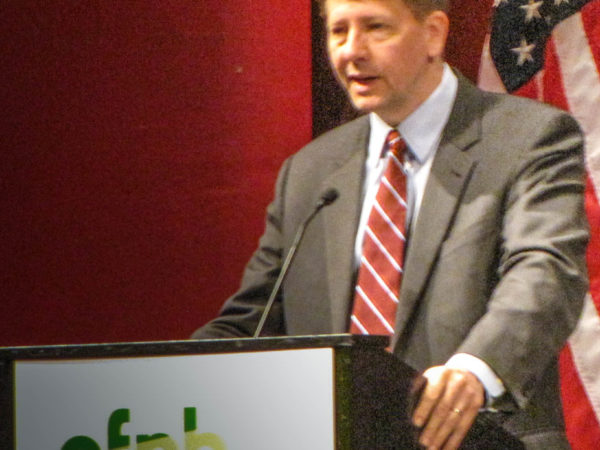
A crowd of supporters rallied in Barney Allis Plaza today in support of changes to payday loan lending laws while a federal committee met to discuss proposed new regulations.
A federal bureau today in Kansas City proposed new rules to curb payday lenders.
The changes would make it harder for those lenders, vehicle title lenders and some expensive installment lenders to roll over loans and to remove money from bank accounts of borrowers.
They would put most such lenders out of business, said industry members on a panel.
Good riddance, said several others on the panel.
Richard Cordray, director of the Consumer Financial Protection Bureau, announced the proposed rule changes before the group hosted the panel discussion at the Kansas City Music Hall.
Mayor Sly James also spoke, noting that payday lenders in Missouri can charge interest rates up to 455 percent.
Fourteen other states and DC have capped such rates to stop predatory lending and the U.S. Congress capped it at 36 percent for loans to military members.
But congress did not give Cordray’s bureau the power to cap rates so it has been up to states.
Repeated attempts for a cap in Missouri have failed, and James called on state legislators to act.
As for the current 455 top rate, he said, “It’s obscene, it’s immoral, it should be illegal.”
The federal rule changes would come under the bureau’s authority to clean up unfair, deceptive or abusive practices.
The loans intended to get low-income consumers through an emergency instead too often become debt traps, Cordray said.
Nearly four of five payday loans are reborrowed within a month, he said, and one-in-four loans results in a sequence of at least 10 loans, with high interest rates and repeated fees as they go along.
There are similar issues with the auto title loans, where the borrower uses title to his vehicle as collateral for a loan of usually to be about 30 days.
One-in-five of these loans ends with the borrowers losing his vehicle because he cannot repay the loan, Cordray said.
High-cost installment loans often have balloon payments after several interest only payments and one-third of those loans end in default.
One rule change would require such lenders to determine whether a borrower can afford the full amount of each payment and still pay living expenses. It would also limit the number of short-term loans that can be made quickly, one after the other.
Another change would specify that lenders would have to get borrower permission again to access a bank account after two consecutive unsuccessful attempts because of lack of funds.
That would save the borrower more overdraft fees or worse. A bureau study over 18 months also found that up to a third of such borrowers lost their bank accounts because lenders kept diving into them to try to take money that was not there.
Darrin Anderson, president and CEO of CQ Holdings Inc., said the changes would put 70 percent of payday loan companies out of business.
He and others in the business said most borrowers use the loans properly and few complain.
They noted results of a recent survey that found that fewer than 40 percent of adult Americans have the savings to cover a $500 car repair bill.
At a time when more and more people are using the loans, Anderson asked, what will replace them if they are regulated away.
Wade Henderson, president and CEO of the Leadership Conference on Civil and Human Rights, said banks and other lenders would step in. He suggested that post offices could start handling the small loans.
Kerry Smith, a lawyer with Legal Services of Philadelphia, said her state is among those with laws that prevent predatory lending.
People in Pennsylvania do not miss payday loans, she said.
“They’re the equivalent of financial quicksand – easy to fall into but almost impossible to escape.”
The bureau rules now go to a 90-day public comment period.
A crowd of supporters rallied in Barney Allis Plaza today in support of the changes, sometimes chanting, “Got to beat back the shark attack,” and “Payday loans have got to go, hey ho, hey ho.”




Trackbacks